Related Research Articles

Rankin Inlet is an Inuit hamlet on the Kudlulik Peninsula in Nunavut, Canada. It is the largest hamlet and second-largest settlement in Nunavut after the territorial capital, Iqaluit. Rankin Inlet is the regional centre for the Kivalliq Region.
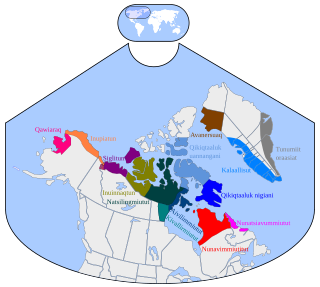
Inuktitut, also known as Eastern Canadian Inuktitut, is one of the principal Inuit languages of Canada. It is spoken in all areas north of the North American tree line, including parts of the provinces of Newfoundland and Labrador, Quebec, to some extent in northeastern Manitoba as well as the Northwest Territories and Nunavut. It is one of the aboriginal languages written with Canadian Aboriginal syllabics.
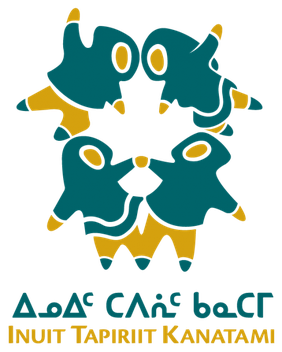
Inuit Tapiriit Kanatami, previously known as the Inuit Tapirisat of Canada, is a nonprofit organization in Canada that represents over 65,000 Inuit across Inuit Nunangat and the rest of Canada. Their mission is to "serve as a national voice protecting and advancing the rights and interests of Inuit in Canada."
Constance Darlene Hunt is a Canadian lawyer, legal academic, and judge. Born in Yorkton, Saskatchewan, she received a Bachelor of Arts degree in 1970 and a Bachelor of Law degree in 1972 from the University of Saskatchewan. In 1976, she received a Master of Law degree from Harvard University.

Nellie Cournoyea is a Canadian politician, who served as the sixth premier of the Northwest Territories from 1991 to 1995. She was the first female premier of a Canadian territory, first Indigenous female premier (Inuvialuk) of a Canadian province / territory and the second female premier in Canadian history after Rita Johnston of British Columbia.
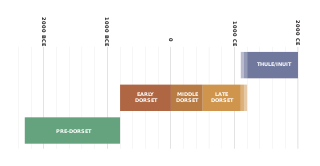
The history of Nunavut covers the period from the arrival of the Paleo-Eskimo thousands of years ago to present day. Prior to the colonization of the continent by Europeans, the lands encompassing present-day Nunavut were inhabited by several historical cultural groups, including the Pre-Dorset, the Dorsets, the Thule and their descendants, the Inuit.

Inuit are a group of culturally and historically similar Indigenous peoples traditionally inhabiting the Arctic and Subarctic regions of North America, including Greenland, Labrador, Quebec, Nunavut, the Northwest Territories, Yukon (traditionally), Alaska, and Chukotsky District of Chukotka Autonomous Okrug, Russia. Inuit languages are part of the Eskimo–Aleut languages, also known as Inuit-Yupik-Unangan, and also as Eskaleut. Inuit Sign Language is a critically endangered language isolate used in Nunavut.
The Arctic Institute of North America is a multi-disciplinary research institute and educational organization located in the University of Calgary. It is mandated to study the North American and circumpolar Arctic in the areas of natural science, social science, arts and the humanities. In addition, it acquires, preserves and disseminates information on environmental, physical, and social conditions in the north. The institute was created in 1945 by a Canadian act of Parliament as a non-profit membership organization, and also incorporated in the state of New York.

The Inuvialuit Settlement Region, abbreviated as ISR, located in Canada's western Arctic, was designated in 1984 in the Inuvialuit Final Agreement by the Government of Canada for the Inuvialuit people. It spans 90,650 km2 (35,000 sq mi) of land, mostly above the tree line, and includes several subregions: the Beaufort Sea, the Mackenzie River delta, the northern portion of Yukon, and the northwest portion of the Northwest Territories. The ISR includes both Crown Lands and Inuvialuit Private Lands. Most of the ISR is represented by Nunakput, the territorial electoral district, meaning "our land" in Inuvialuktun.
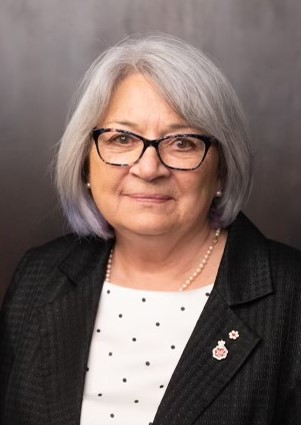
Mary Jeannie May Simon is a Canadian civil servant, diplomat, and former broadcaster who is serving as the 30th governor general of Canada since July 26, 2021. She is Inuk on her mother's side, making her the first indigenous person to hold the office.

Inuit Nunangat, formerly Inuit Nunaat, refers to the land, water, and ice of the homeland of Inuit in Canada. This Arctic homeland consists of four northern Canadian regions called the Inuvialuit Settlement Region, the territory Nunavut (ᓄᓇᕗᑦ), Nunavik (ᓄᓇᕕᒃ) in northern Quebec, and Nunatsiavut of Newfoundland and Labrador.
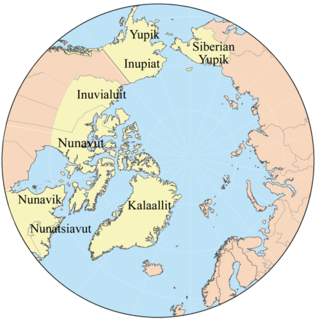
Eskimology or Inuitology is a complex of humanities and sciences studying the languages, history, literature, folklore, culture, and ethnology of the speakers of Eskimo–Aleut languages and Inuit, Yupik and Aleut, sometimes collectively known as Eskimos, in historical and comparative context. This includes ethnic groups from the Chukchi Peninsula on the far eastern tip of Siberia in Russia, through Alaska of the United States, Canada's Inuit Nunangat, including the Inuvialuit Settlement Region, Nunavut Nunavik and Nunatsiavut, through NunatuKavut, to Greenland of Denmark. Originally, an Eskimologist or Inuitologist was primarily a linguist or philologist who researches Eskimo or Inuit languages.

Natan Obed is a Canadian politician who has served as president of the Inuit Tapiriit Kanatami (ITK) since September 2015.
Mini Aodla Freeman is an Inuk playwright, writer, poet and essayist.

Aaju Peter is an Inuk lawyer, activist and sealskin clothes designer. In 2012, she received the Order of Canada.
Laakkuluk Williamson Bathory or Laakkuluk, is a Kalaaleq performance artist, spoken word poet, actor, storyteller and writer based in Iqaluit, Nunavut. She is known for performing uaajeerneq, a Greenlandic mask dance that involves storytelling and centers three elements: fear, humour and sexuality. Bathory describes uaajeerneq as both a political and cultural act and an idiosyncratic art form.
Aluki Kotierk is an Inuk politician. She was born in Iqaluit, Nunavut, but grew up in Igloolik.
Celina Kalluk is a Canadian Inuk artist. She creates and performs in several mediums, notably the tradition of Inuit throat singing. In addition to her work as a musician, Kalluk has also worked as an actress, educator, and a children's author, publishing her debut work in 2014.
John Amagoalik is an Inuk politician from Nunavik (Québec). He campaigned for Inuit rights and made a significant contribution to the founding of the Canadian territory of Nunavut. He was Chairman of the Nunavut Implementation Commission and is widely regarded as the "Father of Nunavut".
References
- 1 2 3 "Different Lives, Common Threads". yukoncollege.yk.ca. 1999-11-14. Archived from the original on 2006-01-09. Retrieved 2008-10-24.
- ↑ "Karla Jessen Williamson".
- ↑ Graham, Amanda (2006-09-11). "Notable Northern Women: Elders/Teachers/Scholars/Scientists". yukoncollege.yk.ca. Archived from the original on 2007-10-22. Retrieved 2008-10-24.
- 1 2 "Karla Jessen Williamson, Contributor". banffcentre.ca. 2008. Archived from the original on 2008-10-27. Retrieved 2008-10-24.
- 1 2 Dickerson, Mark O. "Message from the Acting Executive Director" (PDF). ucalgary.ca. p. 3. Retrieved 2008-10-24.
- 1 2 "ICIHRP Roots of Resilience Project". mcgill.ca. 2008-10-06. Retrieved 2008-10-24.
- 1 2 3 Dickerson, Mark O. (June 2000). "The Challenge of Change" (PDF). Arctic. 53 (2). ucalgary.ca. doi:10.14430/arctic840.
- 1 2 "Karla Jessen Williamson - College of Education - University of Saskatchewan". education.usask.ca. Retrieved 2022-10-14.
- ↑ Urquhart, Dennis (2003-10-17). "From DEW-line to Sea Lane". ucalgary.ca. Archived from the original on 2008-10-04. Retrieved 2008-10-24.
- ↑ Stern, Pamela R. (2004). Historical Dictionary of the Inuit . Scarecrow Press. pp. 154. ISBN 0-8108-5058-3.
karla jessen williamson.
- ↑ "Engaging Voices: a Season of Consultations on the TCPS" (PDF). Interagency Advisory Panel on Research Ethics. pre.ethics.gc.ca. 2006-02-17. p. 2. Retrieved 2008-10-24.[ dead link ]
- ↑ "Changing Environment & Human Health". arctichealth.org. 2006. Archived from the original on January 6, 2009. Retrieved 2008-10-24.
- ↑ "Full Proposals for IPY 2007–2008 Activities". ipy.org. Retrieved 2008-10-24.
- ↑ "Dr. Karla Jessen Williamson". ICIHRP Roots of Resilience Project. Retrieved 2022-10-14.
- 1 2 "Karla Jessen Williamson". cca. Retrieved 2022-10-14.
- ↑ "RG Williamson fonds". usask.ca. Retrieved 2008-10-24.
- ↑ Secretariat (2007-08-08). "Employees". research.ku.dk. Retrieved 2022-10-14.
- ↑ Einarsson, Niels; Nymand Larsen, Joan; Nilsson, Annika; Young, Oran R. (2004). Arctic Human Development Report. Stefansson Arctic Institute, under the auspices of the Icelandic Chairmanship of the Arctic Council 2002-2004. ISBN 978-9979-834-45-8.
- ↑ Kirmayer, Laurence J. "Commentary Inuit Ways of Knowing: Cosmocentrism and the Role of Teasing in Child Development".
{{cite journal}}: Cite journal requires|journal=(help)